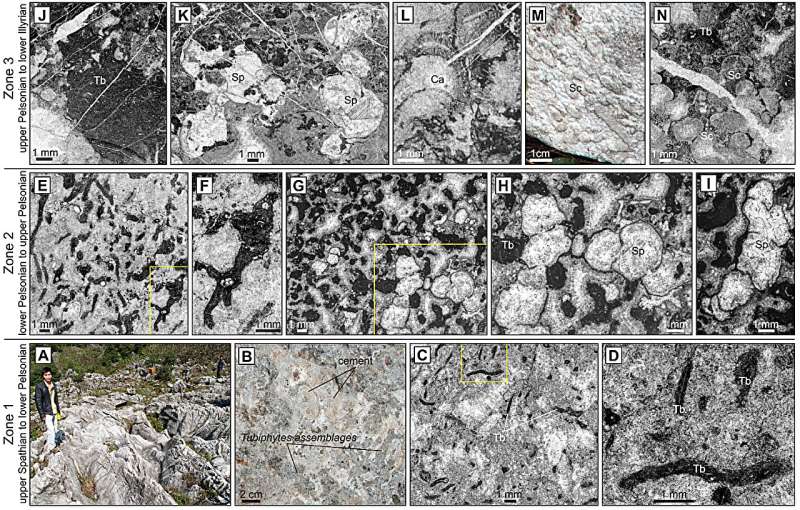This article has been reviewed according to Science X's editorial process and policies. Editors have highlighted the following attributes while ensuring the content's credibility:
fact-checked
peer-reviewed publication
trusted source
proofread
Research finds reefs recovered more slowly than broader ecosystem following ancient extinction

Coral reefs, among the most diverse and valuable ecosystems on Earth, are under threat due to the changing climate. In a new study, an international research team found that if reefs were to disappear entirely, it may take millions of years—even after environmental conditions improve—for them to recover.
The scientists analyzed fossils from an ancient shallow sea in modern-day China that captures the end-Permian extinction event and its aftermath some 250 million years ago. They found that after other marine ecosystems had recovered, it took millions of years for biodiverse reefs to rebound. They reported their findings in the journal Geology.
"Our work suggests that if we damage ecosystems to the point of extinction, we can't assume that biodiverse ecosystems can recover rapidly after conditions improve," said corresponding author Brian Kelley, assistant professor of geosciences at Penn State. "It could take millions of years for complex and fragile ecosystems to come back to their pre-extinction levels. It suggests that if we can't stop the degradation of modern reefs, it could take millions of years for them to recover."
Corals are colonies of tiny marine animals that create rocky exoskeletons made of calcium carbonate, or limestone. Because of this, coral fossils are preserved in the limestone rock record—layer on top of layer. The fossil site in southern China records an exceptionally long history—roughly 15 million years—ranging from before the end-Permian extinction through the recovery interval.
"It would be like if you went to the Bahamas today and went snorkeling on the Great Bahama Bank—what would be underneath you would be just like these old platforms that are preserved in the mountains of southern China," Kelley said. "It's a unique place for this time interval."
The scientists collected hundreds of reef samples and used a point-counting method, selecting hundreds of points in each sample, to identify and quantify the reef fossils present throughout the history of the reef. They found organisms that make reefs, like calcareous sponges, calcareous algae and early scleractinian corals, recovered gradually over a prolonged period, instead of all at once.
"If they all occurred suddenly in the geologic record, it would imply that once environmental conditions improve you can rapidly redevelop biodiverse and complex ecosystems," Kelley said. "But if one reef builder returns to the fossil record, and then millions of years go by and another returns—it suggests that more complex, interdependent ecosystems like rainforests and coral reefs need much longer time intervals to reassemble."
The recovery of biodiverse reef ecosystems took two to four million years longer than the broader marine ecosystem recovery, the scientists said. The findings contrast previous work on younger reefs that suggested these ecosystems can recover more rapidly.
"Most of the evidence we have suggests that, by the time the reef initiates, environmental conditions had already improved substantially from the extinction," Kelley said. "Five million years had passed. But these early reefs were unusually low in biodiversity. The geochemical and fossil evidence from other ecosystems suggests that environmental conditions should have been favorable, but it took an additional 2 to 4 million years for more biodiverse and complex reefs to form."
The end-Permian extinction is considered the worst mass extinction in the last 500 million years and may not represent a perfect analog for modern climate change, the scientists said. But many of the conditions that existed—high levels of ocean acidification, high ocean temperatures and lower oxygen levels—are all issues facing modern oceans.
"Many of the environmental threats we are concerned about in the modern and future ocean were present in this ancient time interval," Kelley said. "So, it's a useful time for understanding what might happen in the future."
Coral reefs are vital ecosystems for many species of animals and have significant economic impacts—protecting coastlines from erosion and providing food and revenue from things like tourism for developing nations across the world, the scientists said.
"This study demonstrates how important it is to conserve reefs now," Kelley said. "If we don't, we could lose reefs and other fragile ecosystems for millions of years."
Future work may involve sampling and analyzing other nearby reef sites in the same basin, according to researchers.
More information: Brian M. Kelley et al, Prolonged and gradual recovery of metazoan-algal reefs following the end-Permian mass extinction, Geology (2023). DOI: 10.1130/G51058.1
Journal information: Geology
Provided by Pennsylvania State University




















